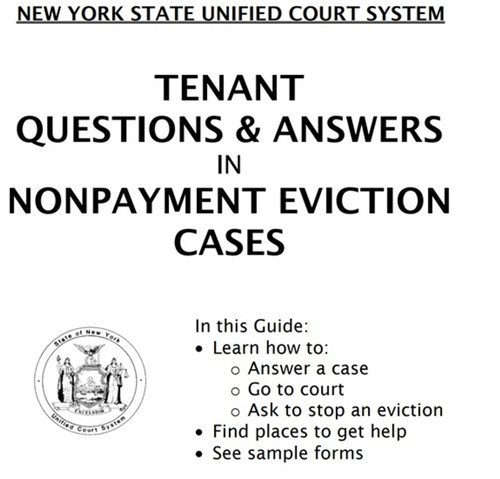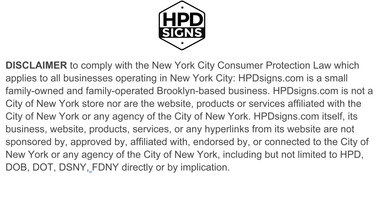Tenant's and LandloardGuide: Nonpayment Eviction Case (PDF file)
- Availability:
- USUALLY SHIP WITH IN 1-2 BUSINESS DAY
Description
Tenant's and LandloardGuide: Nonpayment Eviction Case pdf file
Published by the New York State Unified Court System , provides tenants with essential information on nonpayment eviction cases in district, city, town, and village courts outside of New York City.
Key Topics Covered:
-
Understanding Nonpayment Eviction Cases
- A landlord starts a nonpayment eviction case when they claim a tenant owes rent.
- A holdover case (not covered in this guide) involves lease violations or expiration.
-
Landlord's Responsibilities Before Filing a Case
- Must send a written notice via certified mail if rent is 5 days overdue.
- Must send a written rent demand giving at least 14 days to pay before filing a court case.
-
Court Process and Answering the Petition
- A Notice of Petition and Petition will include the court date.
- The tenant must answer the petition in writing or orally in court.
- Possible legal defenses include improper service, incorrect rent charges, refusal to accept rent, or poor apartment conditions.
-
Court Procedures
- Tenants must prepare with proof of rent payments, photos of poor conditions, and witnesses.
- On court day, tenants should arrive early, dress formally, and request an interpreter if needed.
- Settlements can be made, but tenants should ensure fair terms and written agreements.
-
Trials and Court Decisions
- If no settlement is reached, a trial will determine whether the tenant owes rent.
- A judge may order a rent reduction (abatement) if housing conditions are poor.
- If the tenant loses, they can appeal but must act quickly.
-
Eviction Process
- If a judgment is entered, a Marshal, Sheriff, or Constable can issue a 14-day eviction notice.
- The eviction can be postponed (stayed) by filing an Order to Show Cause (OSC).
-
Post-Judgment Options
- Tenants can ask the court to stop the eviction by proving hardship or improper process.
- If already evicted, they can request a judge to reinstate possession in extreme cases.
- Tenants can seek additional time to pay or complete necessary repairs.
-
Legal Assistance and Resources
- Tenants can find legal aid, dispute resolution services, and emergency financial assistance.
- Provides information on tenant rights, rent control/stabilization, and discrimination protections.
-
Forms and Sample Documents
- The guide includes templates for Answers, Orders to Show Cause, and Affidavits of Service to assist tenants in responding to court actions.
Important Notes:
- This guide applies only outside New York City.
- Tenants should carefully check the service of legal papers and court procedures to protect their rights.
- Settlements should be clear, fair, and documented to prevent future issues.
DISCLAIMER DISCLAIMER ON LEGAL CODES DISCLAIMER ON SIGN USE GENERAL INFORMATION DISCLAIMER
We are a small, family-owned and family-operated Brooklyn-based business. We are not a City of New York store, nor are our website, products, or services affiliated with the City of New York or any agency of the City of New York. Neither we, nor our business, websites, products, services, or any hyperlinks from our website are sponsored by, approved by, affiliated with, endorsed by, or connected to the City of New York or any agency of the City of New York, including but not limited to HPD, DOB, DOT, DSNY, FDNY, or any federal entity, directly or by implication.
The codes, regulations, and requirements referenced on our website may not represent the most recent or updated versions. State, federal, or local regulatory agencies may have more current or accurate information. We make no warranties or guarantees about the accuracy, completeness, or adequacy of the information provided on this site or linked from it. Customers should verify all information by reviewing the official sources directly.
The requirements for sign content depend on intended use and applicable laws. The buyer is solely responsible for determining the appropriate content for a sign or package of signs. We make no warranty or representation regarding the suitability of any sign for a specific application. It is the customer’s responsibility to ensure that the signs ordered are in compliance with all applicable state, federal, local, and municipal laws. Customers are encouraged to carefully review our Terms and Conditions prior to purchase.
All content on this site is provided for informational purposes only and does not constitute legal advice, professional advice, or a definitive statement of law. For guidance on specific requirements, customers should consult the laws and regulations referenced, as well as any rules applicable in their jurisdiction. You may wish to consult with an attorney or qualified professional to ensure compliance with all applicable legal obligations.
Write a Review

Tenant's and LandloardGuide: Nonpayment Eviction Case (PDF file)







